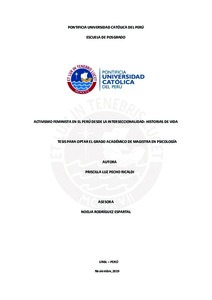| dc.contributor.advisor | Rodríguez Espartal, Noelia | |
| dc.contributor.author | Pecho Ricaldi, Priscilla Luz | es_ES |
| dc.date.accessioned | 2020-01-22T17:44:39Z | |
| dc.date.available | 2020-01-22T17:44:39Z | |
| dc.date.created | 2019 | |
| dc.date.issued | 2020-01-22 | |
| dc.identifier.uri | http://hdl.handle.net/20.500.12404/15642 | |
| dc.description.abstract | La presente investigación tuvo como objetivo explorar el proceso de construcción
como feministas de les participantes de grupos activistas. Para ello, se llevó a cabo un
estudio cualitativo, en el cual se realizaron entrevistas mediante la técnica de historias de
vida, que indagaron sobre la trayectoria de las personas en el activismo feminista. Los
resultados evidencian que el participar en organizaciones feministas les implicó un
proceso arduo al encontrarse luchando contra un sistema patriarcal cisheteronormativo
inserto en todas las esferas de su vida. Además, supuso un quiebre en sus relaciones
interpersonales tanto dentro de la familia, el trabajo, las amistades, entre otros. Sin
embargo, al evaluarse los costos frente a los beneficios que se obtiene como producto del
activismo, elles identifican que son mayores los últimos. Esto al incrementar su sentido
de autoeficacia, brindarles una red de soporte y percibir que sus acciones tienen un
resultado positivo tanto en sus vidas como en las otras personas. | es_ES |
| dc.description.abstract | The present research aimed to explore the process of construction as feminists of
the participants of activist groups. For this, a qualitative study was carried out, in which
interviews were conducted using the life stories technique, which inquired about the
trajectory of people in feminist activism. The results show that participating in feminist
organizations implied an arduous process when they were fighting against a
cisheteronormative patriarchal system inserted in all spheres of their lives. In addition, it
meant a break in their interpersonal relationships both within the family, work,
friendships, among others. However, when evaluating the costs against the benefits
obtained as a result of activism, they identify that the latter are greater. This by increasing
their sense of self-efficacy, providing them with a support network and perceiving that
their actions have a positive outcome both in their lives and in other people. | es_ES |
| dc.description.uri | Tesis | es_ES |
| dc.language.iso | spa | es_ES |
| dc.publisher | Pontificia Universidad Católica del Perú | es_ES |
| dc.rights | info:eu-repo/semantics/openAccess | es_ES |
| dc.rights.uri | http://creativecommons.org/licenses/by-nc-nd/2.5/pe/ | * |
| dc.subject | Feminismo | es_ES |
| dc.subject | Interseccionalidad (Sociología) | es_ES |
| dc.title | Activismo feminista en el Perú desde la interseccionalidad: historias de vida | es_ES |
| dc.type | info:eu-repo/semantics/masterThesis | es_ES |
| thesis.degree.name | Maestro en Psicología | es_ES |
| thesis.degree.level | Maestría | es_ES |
| thesis.degree.grantor | Pontificia Universidad Católica del Perú. Escuela de Posgrado | es_ES |
| thesis.degree.discipline | Psicología | es_ES |
| renati.advisor.orcid | https://orcid.org/0000-0001-8540-241X | es_ES |
| renati.discipline | 313177 | es_ES |
| renati.level | https://purl.org/pe-repo/renati/level#maestro | es_ES |
| renati.type | http://purl.org/pe-repo/renati/type#tesis | es_ES |
| dc.publisher.country | PE | es_ES |
| dc.subject.ocde | https://purl.org/pe-repo/ocde/ford#5.01.00 | es_ES |






